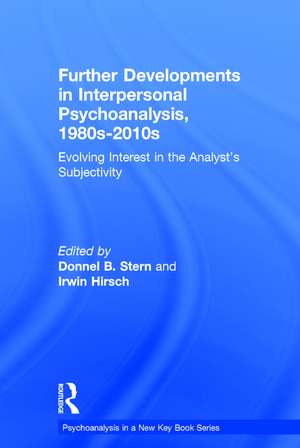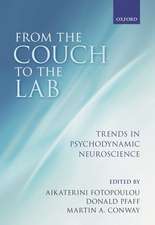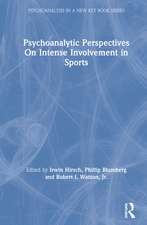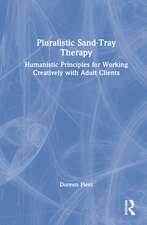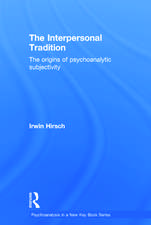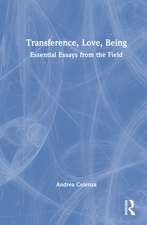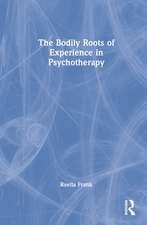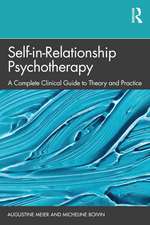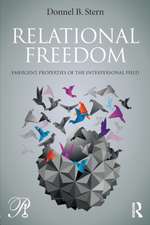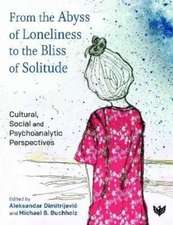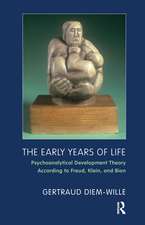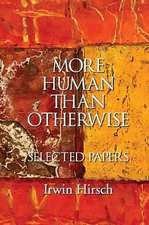Further Developments in Interpersonal Psychoanalysis, 1980s-2010s: Evolving Interest in the Analyst’s Subjectivity: Psychoanalysis in a New Key Book Series
Editat de Donnel B. Stern, Irwin Hirschen Limba Engleză Hardback – 12 dec 2017
The articles selected by the Editors for this second book extend the theme of transference and countertransference that was the throughline of the first book, lending even greater significance in clinical practice to the analyst’s subjectivity and its relation to the patient’s mind. One chapter after another in this book reveal ways that the analyst’s experience can lead to a greater appreciation of the patient’s unconscious experience. It is because of papers such as these that interpersonal psychoanalysis has been described as the origin, at least in North America, of the contemporary clinical interest in psychoanalytic subjectivity. As in the first, the articles in this second book include classic contributions from Bromberg, Greenberg, Hirsch, Mitchell, Levenson, Stern, and Wolstein; these writers are joined here by Blechner, Bonovitz, Buechler, Fiscalini, Held-Weiss, Kuriloff, and White.
North American psychoanalysis has long been deeply influenced and substantially changed by clinical and theoretical perspectives first introduced by interpersonal psychoanalysis. Yet even today, despite its origin in the 1930s, many otherwise well-read psychoanalysts and psychotherapists are not well informed about the field. Along with its companion work, this book provides a superb starting point for those who are not as familiar with interpersonal psychoanalysis as they might be. For those who already know the literature, the book will be useful in placing a selection of classic interpersonal articles and their writers in key historical context.
| Toate formatele și edițiile | Preț | Express |
|---|---|---|
| Paperback (1) | 377.86 lei 43-57 zile | |
| Taylor & Francis – 12 dec 2017 | 377.86 lei 43-57 zile | |
| Hardback (1) | 1102.15 lei 43-57 zile | |
| Taylor & Francis – 12 dec 2017 | 1102.15 lei 43-57 zile |
Din seria Psychoanalysis in a New Key Book Series
- 5%
 Preț: 191.35 lei
Preț: 191.35 lei - 5%
 Preț: 219.54 lei
Preț: 219.54 lei - 5%
 Preț: 234.06 lei
Preț: 234.06 lei - 5%
 Preț: 226.26 lei
Preț: 226.26 lei -
 Preț: 275.46 lei
Preț: 275.46 lei - 5%
 Preț: 259.92 lei
Preț: 259.92 lei - 5%
 Preț: 296.12 lei
Preț: 296.12 lei -
 Preț: 244.87 lei
Preț: 244.87 lei - 5%
 Preț: 195.28 lei
Preț: 195.28 lei -
 Preț: 244.55 lei
Preț: 244.55 lei - 5%
 Preț: 379.44 lei
Preț: 379.44 lei - 5%
 Preț: 230.75 lei
Preț: 230.75 lei -
 Preț: 245.27 lei
Preț: 245.27 lei - 5%
 Preț: 253.66 lei
Preț: 253.66 lei - 5%
 Preț: 219.91 lei
Preț: 219.91 lei -
 Preț: 191.17 lei
Preț: 191.17 lei -
 Preț: 243.92 lei
Preț: 243.92 lei - 5%
 Preț: 233.46 lei
Preț: 233.46 lei - 5%
 Preț: 274.87 lei
Preț: 274.87 lei - 5%
 Preț: 331.05 lei
Preț: 331.05 lei - 5%
 Preț: 239.86 lei
Preț: 239.86 lei - 5%
 Preț: 162.02 lei
Preț: 162.02 lei - 5%
 Preț: 231.44 lei
Preț: 231.44 lei - 5%
 Preț: 259.92 lei
Preț: 259.92 lei - 5%
 Preț: 273.58 lei
Preț: 273.58 lei - 5%
 Preț: 233.68 lei
Preț: 233.68 lei - 5%
 Preț: 1013.89 lei
Preț: 1013.89 lei - 5%
 Preț: 243.97 lei
Preț: 243.97 lei - 5%
 Preț: 278.53 lei
Preț: 278.53 lei - 5%
 Preț: 317.18 lei
Preț: 317.18 lei - 12%
 Preț: 330.99 lei
Preț: 330.99 lei - 12%
 Preț: 938.70 lei
Preț: 938.70 lei - 5%
 Preț: 457.36 lei
Preț: 457.36 lei -
 Preț: 477.40 lei
Preț: 477.40 lei - 17%
 Preț: 238.23 lei
Preț: 238.23 lei -
 Preț: 379.75 lei
Preț: 379.75 lei - 5%
 Preț: 413.98 lei
Preț: 413.98 lei - 11%
 Preț: 275.64 lei
Preț: 275.64 lei - 5%
 Preț: 379.60 lei
Preț: 379.60 lei -
 Preț: 399.79 lei
Preț: 399.79 lei - 5%
 Preț: 1413.95 lei
Preț: 1413.95 lei -
 Preț: 385.88 lei
Preț: 385.88 lei - 5%
 Preț: 362.63 lei
Preț: 362.63 lei
Preț: 1102.15 lei
Preț vechi: 1160.17 lei
-5% Nou
Puncte Express: 1653
Preț estimativ în valută:
210.89€ • 220.78$ • 174.50£
210.89€ • 220.78$ • 174.50£
Carte tipărită la comandă
Livrare economică 07-21 aprilie
Preluare comenzi: 021 569.72.76
Specificații
ISBN-13: 9780415714297
ISBN-10: 041571429X
Pagini: 350
Dimensiuni: 156 x 234 mm
Greutate: 0.61 kg
Ediția:1
Editura: Taylor & Francis
Colecția Routledge
Seria Psychoanalysis in a New Key Book Series
Locul publicării:Oxford, United Kingdom
ISBN-10: 041571429X
Pagini: 350
Dimensiuni: 156 x 234 mm
Greutate: 0.61 kg
Ediția:1
Editura: Taylor & Francis
Colecția Routledge
Seria Psychoanalysis in a New Key Book Series
Locul publicării:Oxford, United Kingdom
Public țintă
Postgraduate and ProfessionalCuprins
Introduction: Distinguishing features of the interpersonal perspective in psychoanalysis by Irwin Hirsch.
Prologue to Chapter 1.
1. Roberta Held-Weiss (1985). In praise of actuality.
Prologue to Chapter 2.
2. Jay R. Greenberg (1986). Theoretical models and the analyst's neutrality.
Prologue to Chapter 3.
3. Stephen A. Mitchell (1991). Contemporary perspectives on self: Toward an
integration.
Prologue to Chapter 4.
4. Edgar A. Levenson (1993). Shoot the messenger—Interpersonal aspects of the
analyst's interpretations.
Prologue to Chapter 5.
5. Irwin Hirsch (1996). Observing-participation, mutual enactment, and the new
classical models.
Prologue to Chapter 6.
6. Sandra Buechler (1999). Searching for a passionate neutrality.
Prologue to Chapter 7.
7. Kathleen Pogue White (2002). Surviving hating and being hated.
Prologue to Chapter 8.
8. Mark J. Blechner (2005). The Gay Harry Stack Sullivan.
Prologue to Chapter 9.
9. John Fiscalini (2006). Coparticipant inquiry: Analysis as personal encounter.
Prologue to Chapter 10.
10. Christopher Bonovitz (2009). Looking back, looking forward: A reexamination
of Benjamin Wolstein’s interlock and the emergence of intersubjectivity.
Prologue to Chapter 11.
11. Emily A. Kuriloff (2010). The Holocaust and psychoanalytic theory and praxis.
Prologue to Chapter 12.
12. Philip M. Bromberg (2012). Stumbling along and hanging in: If this be
technique, make the most of it.
Prologue to Chapter 13.
13. Donnel B. Stern (2012). Witnessing across time: Accessing the present from the
past and the past from the present.
Prologue to Chapter 1.
1. Roberta Held-Weiss (1985). In praise of actuality.
Prologue to Chapter 2.
2. Jay R. Greenberg (1986). Theoretical models and the analyst's neutrality.
Prologue to Chapter 3.
3. Stephen A. Mitchell (1991). Contemporary perspectives on self: Toward an
integration.
Prologue to Chapter 4.
4. Edgar A. Levenson (1993). Shoot the messenger—Interpersonal aspects of the
analyst's interpretations.
Prologue to Chapter 5.
5. Irwin Hirsch (1996). Observing-participation, mutual enactment, and the new
classical models.
Prologue to Chapter 6.
6. Sandra Buechler (1999). Searching for a passionate neutrality.
Prologue to Chapter 7.
7. Kathleen Pogue White (2002). Surviving hating and being hated.
Prologue to Chapter 8.
8. Mark J. Blechner (2005). The Gay Harry Stack Sullivan.
Prologue to Chapter 9.
9. John Fiscalini (2006). Coparticipant inquiry: Analysis as personal encounter.
Prologue to Chapter 10.
10. Christopher Bonovitz (2009). Looking back, looking forward: A reexamination
of Benjamin Wolstein’s interlock and the emergence of intersubjectivity.
Prologue to Chapter 11.
11. Emily A. Kuriloff (2010). The Holocaust and psychoanalytic theory and praxis.
Prologue to Chapter 12.
12. Philip M. Bromberg (2012). Stumbling along and hanging in: If this be
technique, make the most of it.
Prologue to Chapter 13.
13. Donnel B. Stern (2012). Witnessing across time: Accessing the present from the
past and the past from the present.
Notă biografică
Donnel B. Stern is Training and Supervising Analyst at the William Alanson White Institute in New York City and Adjunct Clinical Professor of Psychology on the New York University Postdoctoral Program in Psychotherapy and Psychoanalysis. He is the founder and editor of the Routledge "Psychoanalysis in a New Key" book series and author of many psychoanalytic articles and books, the most recent of which is Relational Freedom: Emergent Properties of the Interpersonal Field.
Irwin Hirsch supervises and/or teaches at the Manhattan Institute for Psychoanalysis; the William Alanson White Institute; the NYU Postdoctoral Program in Psychotherapy and Psychoanalysis and the National Institute for the Psychotherapies, National Program. He has authored over 80 journal articles and book chapters and two books: Coasting in the Countertransference: Conflicts of Self-Interest between Analyst and Patient, winner of the Goethe Award; and The Interpersonal Tradition: The Origins of Psychoanalytic Subjectivity.
Irwin Hirsch supervises and/or teaches at the Manhattan Institute for Psychoanalysis; the William Alanson White Institute; the NYU Postdoctoral Program in Psychotherapy and Psychoanalysis and the National Institute for the Psychotherapies, National Program. He has authored over 80 journal articles and book chapters and two books: Coasting in the Countertransference: Conflicts of Self-Interest between Analyst and Patient, winner of the Goethe Award; and The Interpersonal Tradition: The Origins of Psychoanalytic Subjectivity.
Recenzii
"This outstanding new volume takes the reader on a highly informative guided tour of developments in interpersonal psychoanalysis from the 1980s to the present. Stern and Hirsch have done far more than assemble a group of influential papers. Their erudite commentaries place these contributions in a context that allows the reader to appreciate both bold developments and nuanced changes in the field. The result is a wonderful compendium that will be informative to experienced analysts and beginners alike."-Glen O. Gabbard, MD, Editor, Textbook of Psychoanalysis.
"Moving beyond its origins and early period (1960s-1990s), the chapters in this book present the further evolution of the interpersonal perspective –arguably, the most American school of psychoanalysis. Stern & Hirsch identify the core features of this school that distinguish it from other psychoanalytic perspectives, including other relational approaches. Placing the interpersonal approach within the larger psychoanalytic context makes these volumes essential reading at teaching and training centers, especially those that have not been immersed in the interpersonal tradition; and provides writers and scholars an authoritative source for its ideas and concepts."-Bonnie E. Litowitz, Ph.D., Faculty, Chicago Institute for Psychoanalysis, Editor-in-Chief, Journal of the American Psychoanalytic Association (JAPA).
"This book makes an invaluable contribution to our field. In compiling and editing this wide-ranging and fascinating collection of articles by prominent relational analysts, Hirsch and Stern have done a magnificent job of providing a comprehensive overview of some of the most important and innovative work carried out by relational analysts in recent times. For anyone interested in the growth and development of relational psychoanalysis, especially its exploration of, and innovative contributions to, subjectivity in the analytic process, this book is essential reading."-Theodore Jacobs, author of The Possible Profession: The Analytic Process of Change.
"Moving beyond its origins and early period (1960s-1990s), the chapters in this book present the further evolution of the interpersonal perspective –arguably, the most American school of psychoanalysis. Stern & Hirsch identify the core features of this school that distinguish it from other psychoanalytic perspectives, including other relational approaches. Placing the interpersonal approach within the larger psychoanalytic context makes these volumes essential reading at teaching and training centers, especially those that have not been immersed in the interpersonal tradition; and provides writers and scholars an authoritative source for its ideas and concepts."-Bonnie E. Litowitz, Ph.D., Faculty, Chicago Institute for Psychoanalysis, Editor-in-Chief, Journal of the American Psychoanalytic Association (JAPA).
"This book makes an invaluable contribution to our field. In compiling and editing this wide-ranging and fascinating collection of articles by prominent relational analysts, Hirsch and Stern have done a magnificent job of providing a comprehensive overview of some of the most important and innovative work carried out by relational analysts in recent times. For anyone interested in the growth and development of relational psychoanalysis, especially its exploration of, and innovative contributions to, subjectivity in the analytic process, this book is essential reading."-Theodore Jacobs, author of The Possible Profession: The Analytic Process of Change.
Descriere
Further Developments in Interpersonal Psychoanalysis, 1980s-2010s is the second collection of selected classic articles of the modern era by psychoanalysts identified with the interpersonal perspective. This book contains those written by the third and fourth generation of interpersonal psychoanalysts.
